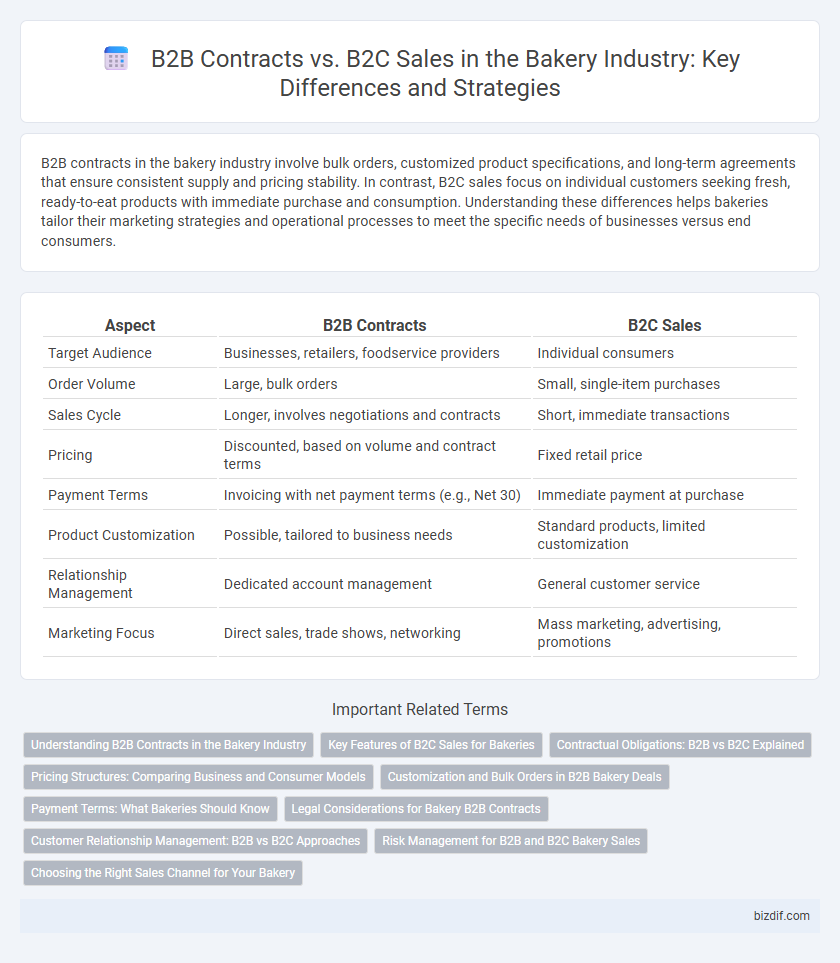B2B contracts in the bakery industry involve bulk orders, customized product specifications, and long-term agreements that ensure consistent supply and pricing stability. In contrast, B2C sales focus on individual customers seeking fresh, ready-to-eat products with immediate purchase and consumption. Understanding these differences helps bakeries tailor their marketing strategies and operational processes to meet the specific needs of businesses versus end consumers.
Table of Comparison
| Aspect | B2B Contracts | B2C Sales |
|---|---|---|
| Target Audience | Businesses, retailers, foodservice providers | Individual consumers |
| Order Volume | Large, bulk orders | Small, single-item purchases |
| Sales Cycle | Longer, involves negotiations and contracts | Short, immediate transactions |
| Pricing | Discounted, based on volume and contract terms | Fixed retail price |
| Payment Terms | Invoicing with net payment terms (e.g., Net 30) | Immediate payment at purchase |
| Product Customization | Possible, tailored to business needs | Standard products, limited customization |
| Relationship Management | Dedicated account management | General customer service |
| Marketing Focus | Direct sales, trade shows, networking | Mass marketing, advertising, promotions |
Understanding B2B Contracts in the Bakery Industry
B2B contracts in the bakery industry typically involve bulk orders, regular supply agreements, and customized pricing, ensuring consistent product quality and delivery schedules tailored to business needs. These contracts often require detailed terms on ingredient specifications, shelf life, and packaging standards to comply with retailer or foodservice client requirements. Understanding these elements helps bakery suppliers establish long-term partnerships and streamline production processes for commercial clients.
Key Features of B2C Sales for Bakeries
B2C sales for bakeries emphasize personalized customer experiences, diverse product offerings, and quick transaction times tailored to individual preferences. These sales typically involve smaller order volumes but require strong brand presence and effective marketing strategies to attract walk-in and repeat customers. Efficient inventory management and seasonal product variations play a crucial role in meeting consumer demand in retail bakery settings.
Contractual Obligations: B2B vs B2C Explained
B2B contracts in the bakery industry typically involve detailed contractual obligations, including specific delivery schedules, quality standards, and volume commitments tailored to business clients. In contrast, B2C sales focus on individual consumer purchases with fewer formal obligations, emphasizing product quality and customer satisfaction without long-term commitments. Understanding these differences ensures bakeries effectively manage expectations and compliance in their B2B partnerships versus their B2C transactions.
Pricing Structures: Comparing Business and Consumer Models
B2B contracts in the bakery industry typically involve negotiated pricing structures based on volume, long-term commitments, and customized product requirements, offering businesses bulk discounts and consistent supply. In contrast, B2C sales feature fixed pricing with standardized product offerings, catering to individual consumer purchases without volume-based discounts. Understanding these distinct pricing models helps bakeries optimize revenue streams by tailoring strategies to meet the unique demands of business clients versus retail customers.
Customization and Bulk Orders in B2B Bakery Deals
B2B bakery contracts often emphasize customization options tailored to specific client needs, enabling businesses to request unique flavors, packaging, or ingredient specifications. Bulk orders are a central feature in B2B bakery deals, allowing companies to benefit from volume discounts and consistent supply for events, retail, or corporate use. This contrasts with B2C sales, which typically involve smaller, individual purchases with limited customization and focus on immediate consumption.
Payment Terms: What Bakeries Should Know
Bakeries must carefully evaluate payment terms in B2B contracts, often involving net 30 to 60-day invoicing cycles, which require efficient cash flow management compared to immediate payment expectations in B2C sales. B2B agreements may include bulk order discounts and negotiated credit limits, influencing revenue consistency and financial planning. Understanding these distinctions helps bakeries optimize payment collections and maintain operational stability across both business models.
Legal Considerations for Bakery B2B Contracts
Bakery B2B contracts require clear terms on product specifications, delivery schedules, payment structures, and liability clauses to minimize disputes and ensure smooth operations. Legal considerations include compliance with food safety regulations, intellectual property rights related to recipes or branding, and confidentiality agreements to protect proprietary information. Detailed contract drafting with legal review helps bakeries secure reliable partnerships and mitigate risks associated with large-scale commercial transactions.
Customer Relationship Management: B2B vs B2C Approaches
B2B contracts in the bakery industry rely heavily on long-term customer relationship management, emphasizing personalized service, trust-building, and tailored product offerings to meet clients' specific business needs. In contrast, B2C sales prioritize volume through broad marketing strategies, focusing on brand loyalty, customer experience, and convenience in purchasing. Effective CRM systems for B2B bakeries integrate detailed client profiles and order histories, while B2C approaches leverage real-time analytics and consumer behavior data to optimize engagement.
Risk Management for B2B and B2C Bakery Sales
Risk management in bakery B2B contracts emphasizes clear terms on delivery schedules, product quality standards, and payment obligations to mitigate supply chain disruptions and financial losses. B2C sales focus risk mitigation on food safety, customer satisfaction, and compliance with labeling regulations to avoid legal issues and reputational damage. Implementing robust quality control and transparent communication channels reduces risks effectively across both B2B and B2C bakery sales models.
Choosing the Right Sales Channel for Your Bakery
Choosing between B2B contracts and B2C sales depends on your bakery's production capacity and target market. B2B contracts often guarantee steady demand from cafes, restaurants, or grocery stores, while B2C sales focus on building direct relationships with individual customers through retail or online channels. Evaluating factors like order volume, profit margins, and customer engagement helps determine the optimal sales channel for sustainable bakery growth.
B2B Contracts vs B2C Sales Infographic

 bizdif.com
bizdif.com